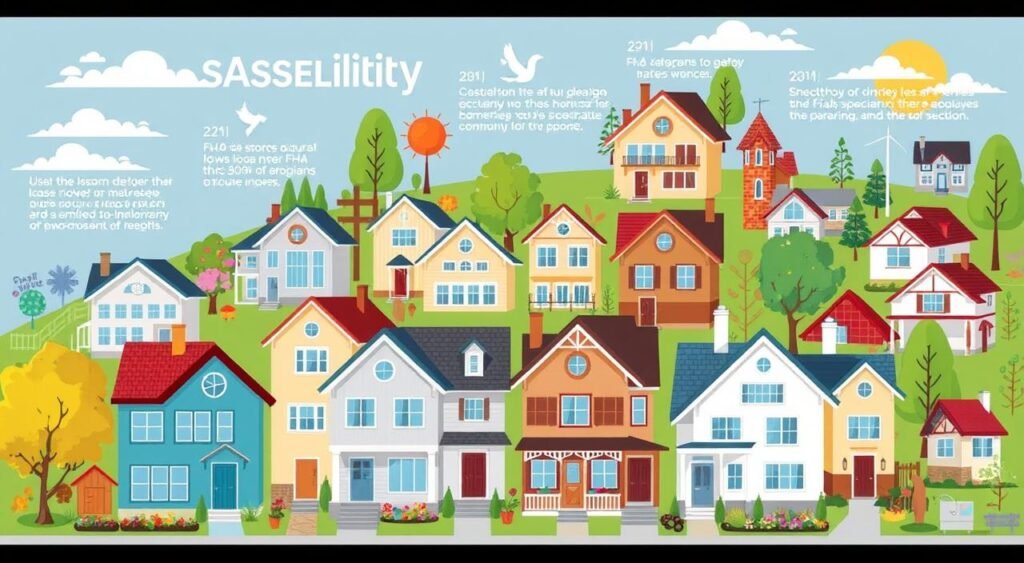If you’re a first-time or low-to-moderate income home buyer in the United States, an FHA loan can be a big help. These loans are backed by the Federal Housing Administration (FHA). They have more lenient requirements than conventional mortgages, making it easier to own a home.
To qualify for an FHA loan, you need to consider a few important things. These include your credit score, the down payment, your debt-to-income ratio, mortgage insurance, and the loan limits in your area.
The minimum credit score for an FHA loan is 500. But, most lenders want a score of at least 620. If your score is 580 or higher, you only need to put down 3.5% of the home’s price. For scores between 500-579, you’ll need to put down 10%.
FHA loans also require you to pay mortgage insurance premiums. You’ll pay these premiums upfront and every month, no matter how much you put down. The loan limits for FHA loans vary by location. They can range from $498,257 to $1,149,825 for single-family homes.
Even with these requirements, FHA loans have some great benefits. They’re easier to qualify for, have shorter waiting periods after credit events, and allow more lenient gift fund rules for down payments. By learning about FHA loans, you can take the right steps to qualify and achieve your dream of homeownership.
Key Takeaways
- FHA loans offer more lenient requirements compared to conventional mortgages, making them a popular choice for first-time and low-to-moderate income home buyers.
- The minimum credit score for an FHA loan is 500, but many lenders require a higher minimum of 620.
- The minimum down payment for an FHA loan is 3.5% for those with a credit score of 580 or higher, or 10% for scores between 500-579.
- FHA loans require mortgage insurance premiums, both upfront and monthly, regardless of the down payment amount.
- FHA loan limits vary by location, ranging from $498,257 to $1,149,825 for single-family homes.
Understanding FHA Loans
The Federal Housing Administration (FHA) loan is a government-backed mortgage. It has helped many homebuyers in the United States. These FHA loans are insured by the FHA, part of the U.S. Department of Housing and Urban Development (HUD). They are a top choice for first-time homebuyers and those with less money.
What is an FHA Loan?
An FHA loan is a government-backed mortgage with better terms than regular loans. The FHA insures these loans, not issuing them directly. This protection lets FHA-approved lenders offer loans with lower credit score needs, smaller down payments, and other benefits.
FHA loans can be used for many property types. This includes single-family homes, multifamily properties, and new construction. The program helps people who might not get traditional mortgage financing.
“The FHA loan program has been a game-changer for countless Americans, providing a pathway to homeownership that may have otherwise been out of reach.”
The Benefits of an FHA Loan
FHA loans have many advantages that make them appealing to many home buyers. They offer more lenient credit requirements and lower down payments and closing costs. This makes owning a home more accessible, especially for first-time buyers and those with limited savings or credit history.
One key benefit is the more flexible credit qualifications. The minimum credit score for an FHA loan is just 500, though lenders often require higher scores. This allows borrowers with poor credit history or recent credit issues, like bankruptcy or foreclosure, to still get a mortgage. Also, FHA loans let you use gift funds from family, employers, or others for the down payment. This down payment can be as low as 3.5% for those with a credit score of 580 or higher.
Moreover, FHA loan benefits include lower closing costs compared to conventional mortgages. This mix of flexible credit qualifications, low down payment options, and possibly lower closing costs makes FHA loans very attractive for many aspiring homeowners.
“FHA loans open the door to homeownership for those who may have struggled to qualify for a traditional mortgage.”
In summary, FHA loans make the journey to homeownership more achievable, especially for first-time buyers and those with limited financial means. They offer more lenient credit requirements, down payment flexibility, and possibly lower closing costs. This makes FHA loans a valuable option for those looking to own a home.
FHA Loan Requirements

To get an FHA loan, you need to meet certain credit score, down payment, and debt-to-income ratio rules. The Federal Housing Administration (FHA) sets these standards. Knowing these requirements is key for anyone looking at FHA mortgages.
Credit Score Requirements
The FHA requires a credit score of at least 500 to qualify. But, many lenders want a score of 620 or 640. If your score is between 500-579, you’ll need to pay 10% down. Scores of 580 or higher let you put down just 3.5%.
Down Payment Requirements
The FHA makes it easy to get a mortgage with a low down payment. You can start with as little as 3.5%. This is a big plus compared to conventional loans, which often ask for 20% or more down.
But, a low down payment means you’ll have to pay mortgage insurance. This adds to your loan’s cost over time.
Also, the property must pass an FHA appraisal. This check makes sure the property is safe and healthy.
| Credit Score | Down Payment |
|---|---|
| 500-579 | 10% |
| 580+ | 3.5% |
While the FHA has these basic rules, lenders can be stricter. They look at your debt-to-income ratio and mortgage insurance costs too. These factors can affect whether you get the loan.
FHA Loan Limits and Mortgage Insurance

FHA loans have specific limits and insurance needs. Loan limits vary by location, from $498,257 to $1,149,825 for single-family homes. These limits adjust for housing costs across the U.S., with higher limits in pricier markets.
For homes with multiple units, like duplexes, loan limits are even higher. This accounts for the extra costs of such properties. All FHA loans need mortgage insurance, which is a must for all borrowers.
Borrowers must pay an upfront mortgage insurance premium. This premium can be added to the loan amount. Also, monthly premiums are needed for the loan’s life if the down payment is under 10%.
If the down payment is 10% or more, monthly premiums last for 11 years. This insurance helps protect lenders in case of default. It allows FHA-approved lenders to offer better terms to homebuyers.
FHA Loan Limits
FHA loan limits are set by the Federal Housing Administration. They change based on where the property is located. These limits help make FHA loans available to more buyers, while also considering housing costs nationwide.
- Low-cost areas: $498,257
- High-cost areas: $1,149,825
Mortgage Insurance Premiums
All FHA loans require mortgage insurance to protect lenders. Borrowers must pay an upfront premium, which can be included in the loan. Monthly premiums are needed for the loan’s life if the down payment is less than 10%.
If the down payment is 10% or more, monthly premiums last for 11 years. This insurance is key for FHA-approved lenders to offer better loan terms to buyers.
| Loan-to-Value Ratio | Upfront Mortgage Insurance Premium | Monthly Mortgage Insurance Premium |
|---|---|---|
| Less than 90% | 1.75% of the base loan amount | 0.80% of the base loan amount |
| Greater than or equal to 90% | 1.75% of the base loan amount | 0.85% of the base loan amount |
Mortgage insurance premiums are crucial. They help FHA-approved lenders offer better loan terms. This makes FHA loans a popular choice for those without a 20% down payment.
Specialty FHA Loan Programs

The Federal Housing Administration (FHA) has more than just standard home loans. They offer special loans for different needs. These loans help people buy various types of homes and even fund home improvements.
The FHA 203(k) rehabilitation mortgage is a favorite among borrowers. It lets you buy and fix up a home with one loan. This is great for those who want to buy a home that needs some work.
There’s also the energy-efficient mortgage (EEM). It helps pay for home upgrades that save energy. This includes things like solar panels and new appliances. It makes homes more efficient and can lower utility bills.
The FHA also has construction-to-permanent loans. These loans cover the construction phase and then become a permanent mortgage. It’s perfect for building your dream home.
Lastly, the FHA insures loans for manufactured homes. These homes must meet size and foundation standards. It’s a good option for those looking for affordable housing.
These special FHA loans show the FHA’s dedication to helping more people own homes. They cater to those who want to fix up a home, live in an energy-efficient home, build a new one, or buy a manufactured home.
Applying for an FHA Loan

Ready to get an FHA loan? First, find an FHA-approved lender. These lenders work with the Federal Housing Administration (FHA) to offer FHA-insured mortgages. An experienced FHA lender can help you through the application process and get the best terms.
Choosing an FHA-Approved Lender
When looking at FHA loan offers, remember that FHA-approved lenders have their own rates, fees, and credit score needs. This means you should compare offers from different lenders to find the best one for you.
To apply for an FHA loan, you’ll need to show your income, assets, credit history, and property details. Your lender will also get an FHA appraisal to check if the home meets FHA standards.
With the right FHA lender, applying for an FHA loan can be easy. You’ll enjoy benefits like low down payments and flexible credit requirements.
“The FHA loan application process may seem daunting, but with the right FHA-approved lender, it can be a straightforward and rewarding experience.”
| FHA Loan Requirement | Details |
|---|---|
| Minimum Credit Score | 580 (with a 3.5% down payment) or 500 (with a 10% down payment) |
| Down Payment | As low as 3.5% of the home’s value |
| Debt-to-Income Ratio | Up to 43% (with compensating factors) |
| Employment History | Stable employment for the past 2 years |
Also Read: What Loans Are Available For College Students?
Conclusion
FHA loans are a key way for many Americans to own a home. They help first-time and low-to-moderate income buyers. FHA loans have easier credit, down payment, and debt-to-income rules.
This makes it easier for more people to buy a home. The FHA’s mortgage insurance helps lenders offer these loans. It also protects them if the borrower can’t pay back the loan.
The FHA offers more than just home purchase loans. They have special loans for fixing up homes and for energy-efficient homes. Knowing about FHA loan requirements and benefits helps buyers decide if an FHA loan is right for them.
FHA loans are crucial for more Americans to own homes. They make it easier to get a loan because of their lenient rules. This helps more people achieve their dream of owning a home.
FAQs
Q: What is an FHA loan and how does it work?
A: An FHA loan is a mortgage loan backed by the Federal Housing Administration (FHA). It is designed to help lower-income and first-time homebuyers qualify for a home loan by offering lower down payment requirements and more lenient credit guidelines compared to conventional loans. The FHA loan work by insuring the loan, which reduces the risk for lenders and allows them to offer better terms to borrowers.
Q: What are the different types of FHA loans?
A: There are several types of FHA loans available, including the FHA home loan for purchasing a primary residence, FHA cash-out refinance for accessing home equity, and FHA streamline refinance for reducing monthly mortgage payments without the need for extensive documentation. Each type of FHA loan has its own specific guidelines and requirements.
Q: Can I qualify for an FHA loan with a lower credit score?
A: Yes, FHA loans are known for being accessible to borrowers with lower credit scores. While the FHA guidelines generally recommend a minimum credit score of 580 for a 3.5% down payment, borrowers with scores as low as 500 may qualify for an FHA loan with a higher down payment. However, lenders may have their own credit requirements.
Q: What are the FHA mortgage insurance requirements?
A: FHA mortgage insurance is required for all FHA loans to protect lenders against losses. There are two types of premiums: an upfront mortgage insurance premium (UFMIP) paid at closing and an annual mortgage insurance premium (MIP) that is paid monthly as part of your mortgage payment. The amount of MIP depends on the loan type and the amount of your down payment.
Q: How does the refinance process work for an FHA loan?
A: The refinance process for an FHA loan can be done through an FHA streamline refinance, which allows eligible borrowers to refinance their existing FHA loan with less documentation and no appraisal required. This may result in a lower interest rate and a more affordable monthly mortgage payment. FHA cash-out refinance is another option, allowing homeowners to access equity for cash.
Q: What are the property requirements for an FHA home?
A: To qualify for an FHA home loan, the property must meet specific FHA guidelines. This includes being a primary residence, meeting minimum property standards for safety and livability, and being located in an eligible area. The FHA also has mortgage limits that vary by region, which determine the maximum loan amount available.
Q: How do I know if I may qualify for an FHA loan?
A: To determine if you may qualify for an FHA loan, consider your credit score, income requirements, and debt-to-income ratio. Generally, FHA loans are designed for borrowers with lower credit and income levels. Consulting with a loan officer can help you assess your eligibility and guide you through the application process.
Q: What is the difference between an FHA loan and a conventional loan?
A: The main difference between an FHA loan and a conventional loan lies in the down payment, credit score requirements, and mortgage insurance. FHA loans typically require a lower down payment and are more lenient with lower credit scores, while conventional loans usually require higher credit scores and larger down payments. Additionally, FHA loans require mortgage insurance for the life of the loan, whereas private mortgage insurance (PMI) for conventional loans may be canceled once equity is built.
Q: Can I use an FHA loan to purchase a second home?
A: Generally, FHA loans are intended for primary residences, and using an FHA loan to purchase a second home is not allowed. However, there are specific exceptions, such as if the second home is for a family member or if the borrower is relocating. It is important to consult with a loan officer to understand the specific FHA guidelines regarding this matter.
Source Links
- https://www.winthehouseyoulove.com/videos/10-hidden-fha-loan-tips-tricks
- https://www.mpamag.com/us/mortgage-industry/guides/fha-loan-requirements-tips-and-advice/432424
- https://www.nerdwallet.com/article/mortgages/fha-loan






